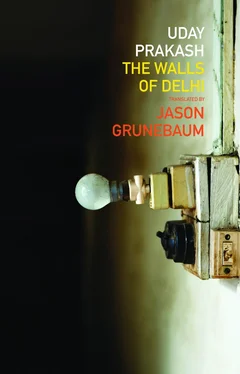Bisnath was from a high caste, Mohandas a low Kabirpanthi weaver. Many of Mohandas’s brethren still wove mats and rugs and blankets. Mohandas wasn’t merely the first member of his community from the village to get a college degree, but the first in the entire region. And he not only finished his degree, but also graduated second in his class.
(Please stop for a moment and tell the truth: did you begin to get the feeling that I’d gone and started telling you some kind of encoded, symbol-laden tale? The main character of the story is called Mohandas, the wife is Kasturibai, the mother is Putlibai and the son’s name is Devdas…?
Kasturibai reminds you of Kasturba — and, well, Mohandas couldn’t be more clear. If you read Mahatma Gandhi’s autobiography, also known as The Story of My Experiments with Truth, you’ll discover that his father, Karamchand, was also called Kaba. And His mother was Putlibai… and who doesn’t know the tale of his son, Devdas? Look at Mohandas, his build, and the state he’s in: he shares the same history as the Mahatma. The difference is that Mohandas looks the way he does not because of Porbandar — the place where Gandhi was born — or Kathiawar, Rajkot, England, South Africa, or Birla House, but as a result of the hunger and heat, sweat and sickness, insult and injustice in the fields and pastures, caverns and caves, jungles and marshes, of Chhattisgarh and Vindhya Pradesh. Otherwise, all the rest is the same.
I’d also like to stop the story right here and now to solemnly affirm that the similarity of names is honestly and truly just a coincidence. When I sat down to write this, I had no idea these sorts of echoes could possibly be hidden in the story of Mohandas and his family from the village.
You’ll have to take my word, and don’t read too much into it. It isn’t some symbolic story or allegory or coded fable. It’s totally on the level. Though, truth be told, it’s not really a story. As I’m wont to do, I wind up detailing the real life of a real person — someone alive now, living among us in our society — concealing it behind the veil of a story. Mohandas is a living, breathing human being, and his life is at this moment in grave danger. Though you can count on my having played a little fast and loose with the truth, as I always do.
My game, however, is like the game of trying to hide an elephant with a washcloth.
Assume that the elephant is a truth. If a poet or writer tries to hide the animal behind a meagre washcloth, he risks burning his bridges and sinking the boats that ferry him through the journey of life.
Mohandas is real. If you’d like to verify this, you can do so by asking any inhabitant of our village, or any other village in this country.)
Mohandas’s mother and father had high hopes that when he got his BA he would soon find a good job. He’d been married by the age of fifteen to Kasturi, the daughter of Biranju, from Katkona village. She was a hard worker. After arriving at her in-laws’ after the wedding, she immediately began looking after the entire household, even taking on small chores for the neighbours; the money she earned allowed Mohandas to pay his college fees. Everyone was watching Mohandas, the first young man from his caste to get a college degree, and at the top of the class. When the exam results were announced, his photo was published in the local papers. Test prep companies even used his photo in their publicity materials.
Mohandas duly registered with the job office, and sent off application after application for openings he’d found in the classifieds. Time and again he received postcards from the job office. He then studied for the public service exam, working much harder than he’d ever worked as a student.
Mohandas travelled anywhere and everywhere looking for work. Though he’d aced his exams at college, he was never invited back after the job interviews. And then he’d discover the people getting hired were those with barely a high school education, if that, or the ones who had graduated in the middle or bottom of their classes. All of them had some kind of connection: either they were the son-in-law, or son, or nephew, or brown noser, or assistant, to a government officer, politician, or big shot. Mohandas came home after every interview with the feeling his luck was running out, but he didn’t give up hope. He knew full well how corrupt India was — but what about the ten or twenty per cent who found work on the basis on merit and hard work?
He realised after a while that some of the positions were auctioned off to the highest bidder. If his father had had fifty or a hundred thousand rupees, Mohandas could have used that as a bribe to get two or three jobs that had otherwise slipped away.
Time went on. He was now past the age limit for a government position. His family began to lose hope. Still, Kasturi kept up her encouragement: No government work, no problem, you’ll get something in the private sector. Or else pick up a trade. The government has plenty of opportunities nowadays for the out-of-work educated. We’ll raise chickens. We’ll start a brisk business selling eggs. We’ll open a shop to make candles or incense, or a little flourmill. Government banks are giving out loans. One time a literacy job came up; he could have found temporary work as a teacher. But in the end it turned out the government official who was in charge of the program was only hiring people from his own caste or political party; Mohandas was of a different caste, and didn’t belong to any political party.
He was totally straightforward; a bit reserved, and had plenty of self-respect. And, sadly, it simply wasn’t in his power to do as much running around as he would have been required to, kissing the arses of government officers or hakims, bribing them with food and drink. And like the jobs themselves, looking for a job was a bloodsport, full of rivalry. It’s not as if Mohandas was afraid of competition — if he had been, how would he have graduated with honours? But he soon discovered the real world was one massive sports stadium, and the ones who scored goal after goal were those who had the power to cripple the other players. And this power came from criminal, illegal connections and back-door deals, nepotism and nefariousness, bribes and rewards — none of which Mohandas had access to.
It wasn’t just Mohandas, but his whole family that began to let go of the dream of his becoming a government officer or hakim, and with great difficulty began to hope that he would just find some job, any job that would free him from joblessness and emptiness, and at least bring home some money to feed the family. This is when his father, Kaba, was diagnosed with TB. He began wheezing, and coughing up blood. And just a little while later Putlibai’s eyes were ruined by the free eye clinic. On top of all of the housework and small jobs she did to earn money, now Kasturi had become the caretaker for her in-laws. This was also when she was in most need of rest, since she was pregnant — Devdas had arrived in her womb.
Looking at Mohandas, you’d think he’d been sick for a long time. He didn’t visit many people from the village. It also became more and more difficult for him to face his fellow villagers or caste brethren, so he avoided them all. The same question was on everyone’s lips: ‘What’s he up to, and has he sorted out a job yet?
The Kathina river flowed nearby. Like most people from the village, Mohandas planted various melons, cucumbers, and gourds in the summer months on its banks. His wife and parents joined him — they dug irrigation ditches to bring water to the seedlings. They worked in shifts, afternoons and evenings, watching over everything to make sure the digging went smoothly; the crops brought them an extra nine or ten thousand rupees per year. Though a few times the monsoon came at the wrong time, causing the river level to rise; whatever crops had been ready for harvest were washed away by the swelling current. Twice this happened to Mohandas. A dark pessimism began to grow inside.
Читать дальше










